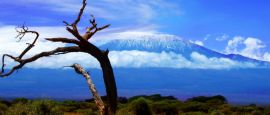Tanzania: Doing business & staying in touch
Doing business in Tanzania
Normal courtesies should be shown when visiting local businesspeople. English is the language used for business. Lightweight suits are usually expected to be worn for meetings. Appointments are generally necessary.
Tanzania’s economy relies heavily on agriculture; the sector employs around 80% of the working population and cash crops are one of the country's main export earners, which accounts for nearly half of the country’s GDP. Mineral production (gold, diamonds and tanzanite) has grown significantly in the last decade, and mining represents Tanzania's biggest source of economic growth, provides over 3% of the GDP and accounts for half of Tanzania's exports.
Coal, phosphates, gypsum, tin and other ores are also extracted. Reserves of uranium, nickel, silver and natural gas have been located and the mining sector is expected to be developed further to capitalise on these resources. The industrial sector is one of the smallest in Africa, concentrated in agricultural processing and light consumer goods such as sugar processing, brewing and textiles. Tourism is thought to be worth around US$950 million annually to the Tanzanian economy and ranks as the second foreign exchange earner after agriculture.
On the whole, the economy has improved steadily since the mid-1990s. In 2006, Tanzania signed economic agreements with China for development assistance in the communications, transport and health sectors and saw the African Development Bank write off US$640 million of Tanzania's foreign debt. More recently, with continued help from donor assistance and a boost from an increase in gold exports, Tanzania's economy has picked up the pace. GDP was a healthy 6.5% in 2010, with inflation estimated to be around 7.2%.
Many of the large hotels in Dar es Salaam and Arusha can accommodate conferences. The Arusha International Conference Centre (AICC) (www.aicc.co.tz) is the largest conference facility in the country and has several rooms that can cater for 20-1,000 people, and this has been the site of some historic events of East Africa's modern history including the Rwandan War Tribunals and Burundi peace negotiations.
Industrial raw materials, consumer goods, machinery and transport equipment, chemicals and crude oil.
Keeping in Touch in Tanzania
In most towns there is an efficient local and international service from public coin and card phone boxes operated by the Tanzania Telecommunications Company Ltd. (TTCL) (www.ttcl.co.tz). These are usually outside or within the post office and in the cities there are separate TTCL offices for phone, fax and Internet. Connections are quick and about a third of the price of a call through hotels, which are expensive for phone calls and faxes.
Roaming agreements exist with most international mobile phone companies. Tanzania’s many cellular networks cover almost all towns, the urban sections of the coast, Zanzibar and the tourist areas, but not some of the parks and reserves or the southwest of Tanzania away from the towns and the main road. SIM and top-up cards for the pay-as-you-go mobile providers are available just about everywhere; in the towns and cities they often have their own shops, but you can buy cards from roadside vendors anywhere, even in the smallest of settlements.
Email can be accessed in internet cafés in main urban areas, which are affordable and efficient. Even smaller towns have at least one, usually on the main street. In the more remote towns, where a satellite connection is used, costs can be a little higher. Tourists can also access the internet in many hotels; the more upmarket and business orientated ones have in-room Wi-Fi. Accommodation in parks and reserves generally don’t have internet.
There are post offices even in the smallest of towns (www.posta.co.tz). Airmail to Europe takes about 5-7 days and to the US about 10 days. EMS is a registered postal service available at all post offices. Courier services take three working days and the major international courier companies such as DHL (www.dhl.co.tz) are represented in the cities and Zanzibar.
Until the 1990s, Tanzania's media was largely state controlled. Founding president Julius Nyerere believed TV would increase the divide between rich and poor and Tanzania is considered to have been one of the last countries in the world to broadcast TV – which it did in 1994. Today, the number of Tanzanians with TVs has risen at a swift rate and most ‘middle class’ urban Tanzanians own a television. Tanzanians are avid radio listeners with an estimated 60% of the population having access to radio. Tanzania enjoys a good level of freedom of press, though there is some bias depending on the ownership of the media.
Government-owned Daily News is Tanzania's oldest newspaper. There are also private English-language newspapers The Guardian and This Day as well as private weeklies Business Times, The Express and Arusha Times.
There are more than 15 private TV channels in Tanzania (in Dar es Salaam alone seven terrestrial channels are broadcast). One of the most popular is Capital run by the IPP media group (www.ippmedia.com) which broadcasts a mix of news (in Kiswahili and English), Swahili dramas, imported soaps and dramas from the USA, UK and South Africa, music videos and European football matches. DSTV (Digital Satellite Television; www.dstv.com), is a South African subscription satellite channel, which has countless international channels and is found in most upmarket hotels, (as well as many restaurants and bars for the sports and music channels).
State-run stations include Radio Tanzania Dar es Salaam, Parapanda Radio Tanzania and Voice of Tanzania-Zanzibar. There are also dozens of private FM radio stations, most of them operating in urban areas; among these networks are Radio Free Africa, Radio One, Radio Sky, Radio Star and Radio Uhuru. News bulletins from international radio stations, including the BBC, Voice of America and Germany's Deutsche Welle, are carried by many stations.








 You know where
You know where